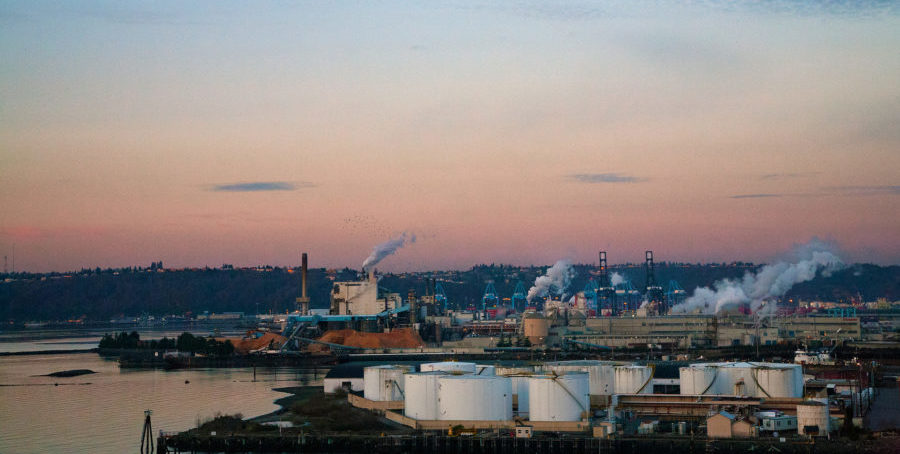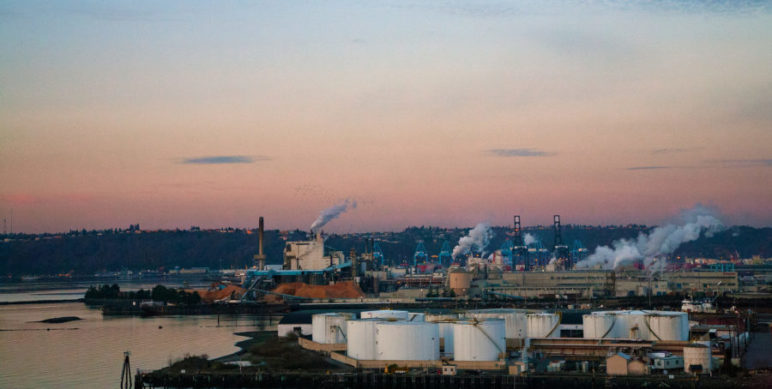If the election results in 2017 are any indication, the Northwest’s Thin Green Line is growing stronger.
The Northwest has seen an onslaught of large-scale fossil fuel development schemes. From coal export terminals to refinery expansions to petrochemical projects, the industry aims to turn the region into a major center for dirty energy. But communities are fighting back.
Amidst tremendous controversy, local elections around the Northwest are, increasingly often, becoming referendums on these fossil fuel projects. That was certainly the case in 2017, the year when big oil tried to buy democracy in Washington with unprecedented political spending. In at least five communities around the state, voters took on fossil fuels at the ballot box where they notched some surprising wins over the energy companies. If the election results in 2017 are any indication, the Northwest’s Thin Green Line is growing stronger.
Here’s what happened around Washington.
Kalama
In a race that functioned as a referendum on a proposed methanol refinery, Planning Commission member Mike Reuter won a surprise victory in his bid for the mayor’s office. He earned a plurality of support, 44 percent, by netting a total of just 388 votes. Reuter ran as an outspoken opponent of the Kalama methanol project, although it is not clear if the city has any legal jurisdiction over the project.
Spokane
A Spokane ballot initiative to levy fines on oil and coal trains passing through the city lost after being outspent more than a hundred-to-one. There, as in other races, the fossil industry massively outspent the measure’s supporters. Although many doubted the legality of the measure (the federal government sharply curtails the power of local governments to act on railroads), the industry took no chances on losing in the court of public opinion. Supporters of the measure raised meager $7,000 pitted against coal and railway company contributions totaling $750,000. The measure lost 42 to 58 percent.
Tacoma
In Tacoma, at least two 2017 races were heavily influenced by the city and port greenlighting two fossil fuel development proposals: a big methanol refinery that was later abandoned by the project backers and a liquefied natural gas (LNG) facility backed by Puget Sound Energy (PSE).
The handling of the LNG project became a central issue in mayoral and port campaigns. Mayoral candidate Victoria Woodards, a former city council member who supports the LNG project, competed against Jim Merritt, who had strong concerns about the safety of the LNG plant and the accuracy of PSE’s public information campaign. Similarly, first-time candidate Kristin Ang, frustrated by the methanol and LNG debacles, ran for a seat on the Port Commission against longtime port official Don Meyer. Woodards appears to have defeated Merritt 54 to 46 percent, while as of this writing Meyer leads Ang 52 to 48 percent. The closeness of the contests suggests that officials will have to do more to appease restive voters concerned about environmental protection and transparency in government.
Vancouver Port
Running on an anti-oil platform, Don Orange won a landslide victory over Kris Greene, 65 to 34 percent, for a seat on the three-member Port Commission in Vancouver. The race set records for political spending as it became a super-heated proxy war over a controversial proposal to build a large oil-by-rail terminal on the Columbia River. Approved several years ago by the local port commission, the project has been extremely unpopular.
In 2015, Eric LaBrant ran for a seat, promising to stop the terminal. He was elected with 57 percent of the vote in the most expensive contest ever seen at Vancouver’s port. This year, however, put 2015 spending in the shade as the oil company behind the project poured $370,000 to the pro-terminal Greene. It was far and away the largest corporate donation in the history of Vancouver’s port (and the largest direct donation to any candidate in all of Washington in 2017) and it came together with hundreds of thousands of dollars more in PAC spending. When Orange takes his seat on the Commission, he is expected to vote with LaBrant to end the Port’s lease with the company, thereby killing the project.
Whatcom County
The Whatcom County Council earned the lasting ire of the fossil fuel industry when it passed a moratorium sharply restricting coal, oil, and gas developments in the Cherry Point industrial area. In 2017, four of the seven council’s seats went up for a vote. It was the first time the county has voted using newly-adopted districts that resulted from an attempt by the coal industry and its allies to gerrymander the council in favor of permitting a huge coal terminal there. (See Kristin Eberhard’s analyses of Whatcom County districting politics here and here.)
Two Bellingham districts easily elected incumbents, both of whom were supported by the environmental community: Rud Browne, who won 82 percent of the vote, and Todd Donovan, who won 65 percent of the vote. A rural east county race went to a pro-fossil fuels candidate, Tyler Byrd, who took 54 percent of the vote in his district. In the one at-large race, which was characterized by over $100,000 of PAC money from the realtor association, the incumbent Barry Buchanan, who supports restricting coal and oil development, appears to have won with 52 percent support. At the end of the day, the county council will retain a large environmental majority.
Note that the voting results we report here are current as of the afternoon ballot drop on November 9.
Thanks to Alex Ramel, John Abbotts, and Jasmine Zimmer-Stucky who contributed information.












Fred Felleman
What about Barry Wenger’s Port race in Bellingham. I wish that had gotten more attention from the beginning.